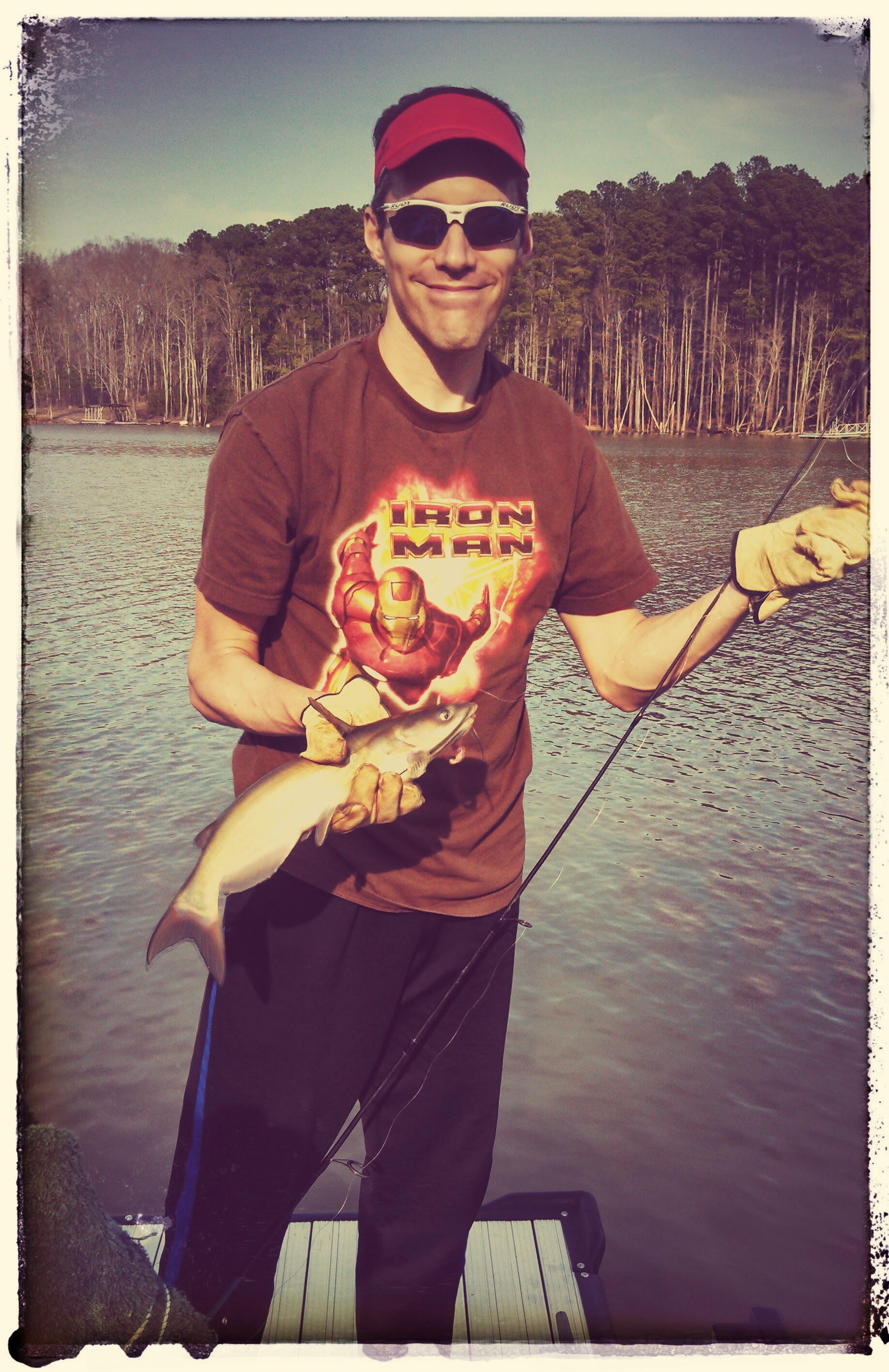fishing
In the water, I see the sky, bluer than the feathers of a bluebird, dramatic with wide, radiant strokes of cloud. It’s enough to steal my breath. The water itself looks silver in the sunlight.
Except when we move across the bridge, the lake and the floating dock are completely still. I settle into a hammock chair with a book—something I never do in the middle of the day, giving thanks for vacation and rest. My chair hangs sheltered from the sun by a cover over the dock that is as blue on the outside as the sky, and here and there beneath, vinyl and plastic owls hang suspended to warn nesting birds away. From where I sit, I can trace the line of trees at the bank with my eyes. I can see the russet color of the earth just at the edge where land meets lake. I can almost feel the soft, cool wet of that ground on my fingertips.
“I am happy not to be doing that,” Zoe says, drawing one leg up into the other hammock chair, balancing a book on her lap. Sometimes I think she misses out on things by mirroring her preferences after mine, and I wonder what she might have done had I not immediately declared that I’d rather read than fish. Maybe fishing is messy and thick with a smell that lingers on the fingers, but the experience can be far more rewarding than its less attractive details.
Kevin bends close to Riley, who is perched at the edge of the dock in a navy blue chair, the kind we fold up and throw in the back of our cars for outdoor events and campfires. Beside her, Adam looks out over the water and stills, holding a timer and Riley’s gratitude journal in his lap. Every few moments, he turns a page, dragging his finger down her lists, pushing at the buttons on his timer. I wonder if the day will come when he can explain his games to the rest of us. He looks up and catches the reflection of the clouds in the water, and just stops. I watch the wrinkle rise between his eyes and wonder what has captivated him. He wanted to stay back at the house doing familiar things, but we insisted that he come out on the boat and down to the dock for fishing. He has accepted this, but still says, “No thank you,” when Kevin speaks to him about trying the fishing.
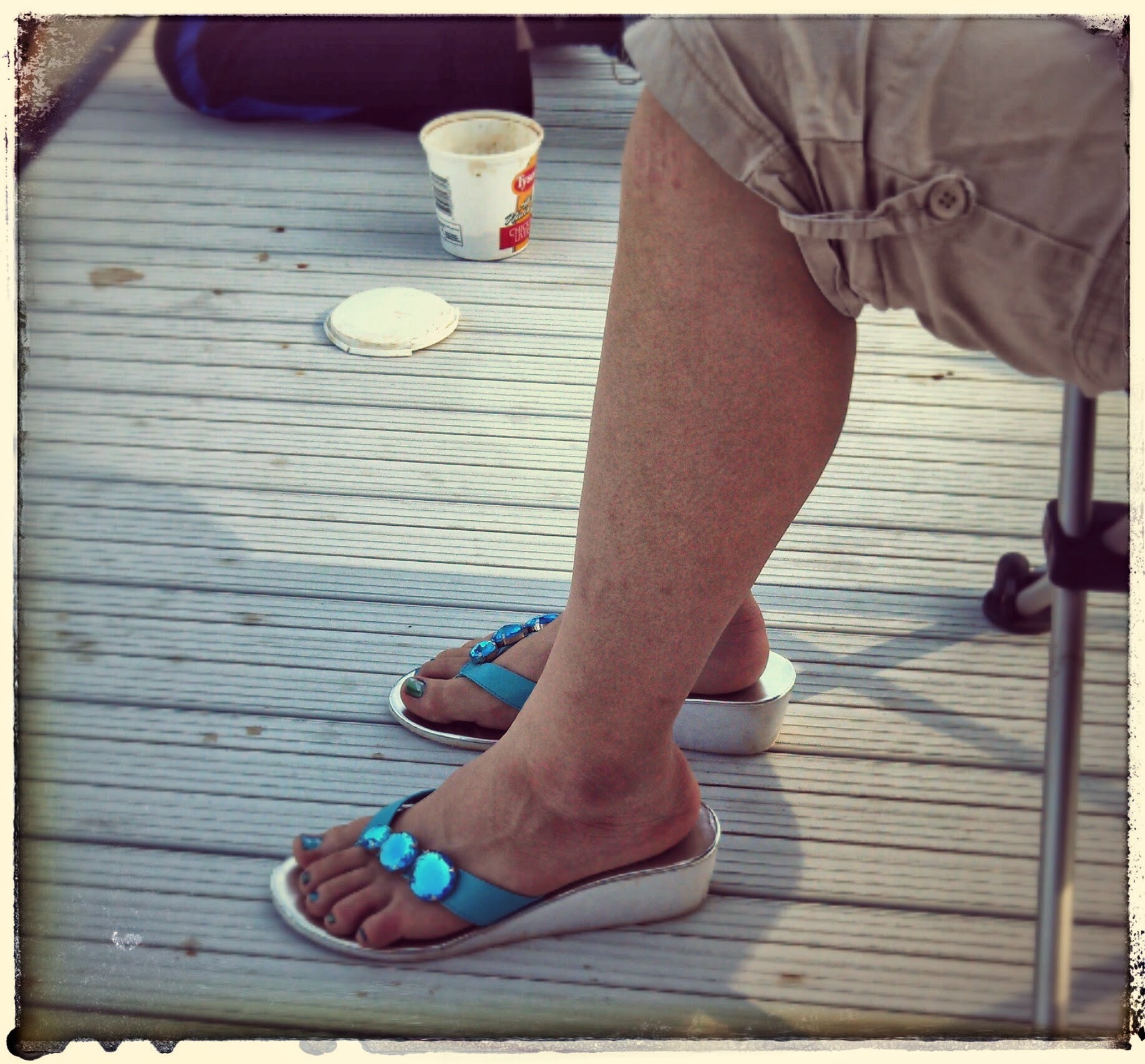
Kevin shows Riley how to thread a chicken liver on a fish hook, how to toss cat food with one hand, scattering it in the water around the dock to draw in the fish. He shows her how to cast her bait into the water. The hook and liver disappear with a satisfying plop and become an extension of her arm, connected to her by a thin, almost transparent length of line that drifts in the current. “Now, just wait,” Kevin says, wiping his fingers on a crumpled square of cloth at his feet. Quietly, Riley holds the rod, looking out over the lake. She will sit this way for hours without speaking, without checking the time or tapping her foot. She has patience most of the rest of us do not understand, a contentment the rest of us aspire to. We all know that when the time comes to pack up our stuff, she will still be happy whether she catches a fish or not.
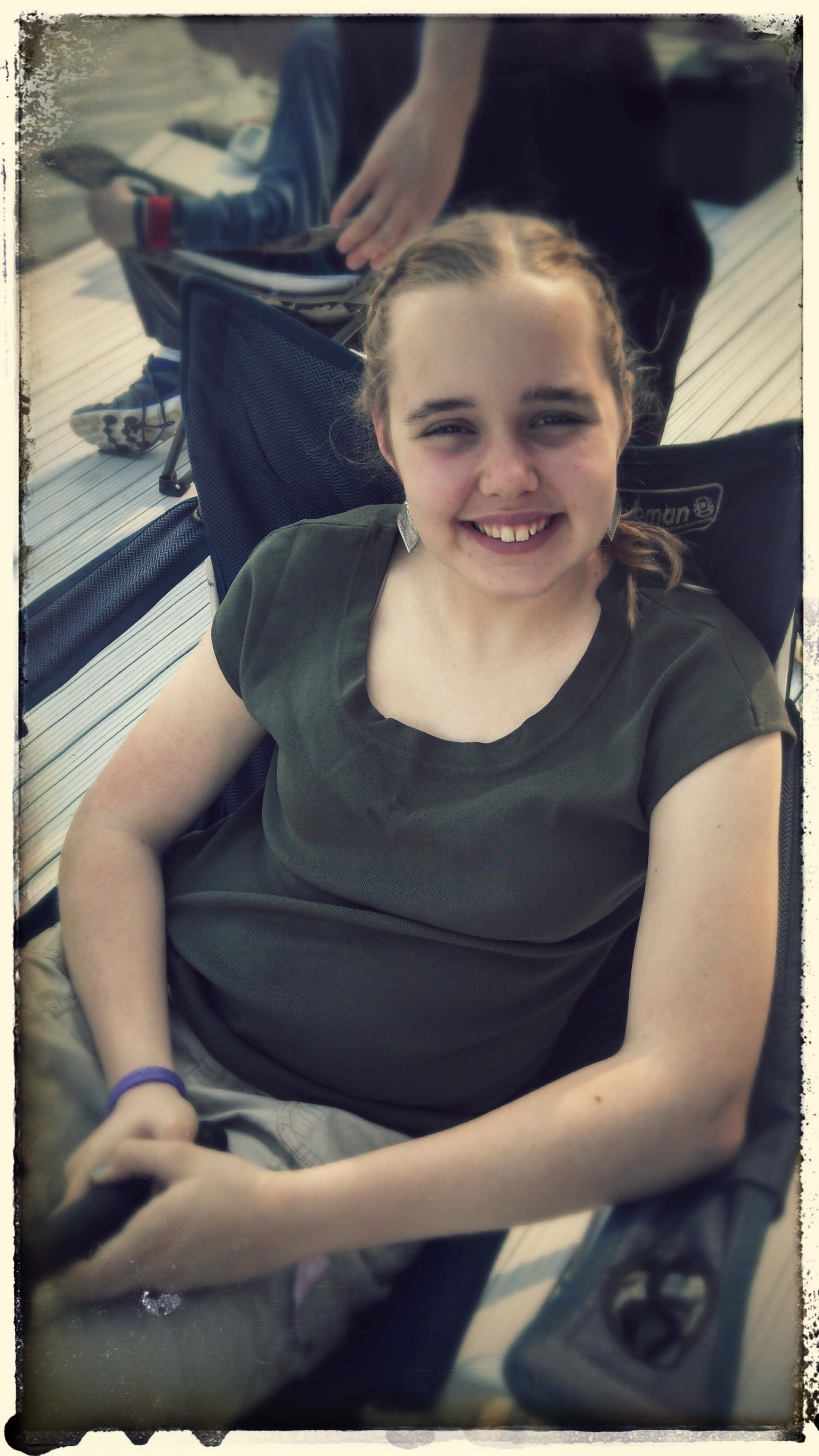
“EEEW,” Zoe says, looking to me for confirmation. “Chicken livers are gross. I have no interest in doing that.”
“So you and I will just read,” I say, looking at her over the top edge of my book, smiling.
“Yes, we most certainly will,” she says, as though together we share some better understanding of things.
Kevin moves to Adam, taking the small container of chicken livers with him, bending down to pick up a second fishing rod from the dock. “Adam, why don’t you try it?”
“Oh, come on,” Adam says, “No. No thank you.” He balances his head in his hands, spreading his fingers out across his cheeks. When given the opportunity to try something new, Adam will always decline. When it comes to the unknown, he’s fearful and often uninterested. He prefers familiarity and ritual, and he doesn’t mind telling us so. So we usually ignore his protests and push, because otherwise he would cease to grow. Thinking of this makes me smile, because I know that this is God’s way with us too, for as long as we choose to be His. He knows we love what we know, but He grows our faith by insisting that we persist through the new and the difficult and the unknown.
“You might like it,” Kevin says, threading the second hook, casting the line. Kevin sits in a third chair on the other side of Adam, and for a while, we breathe in happy, companionable silence, Zoe and I with our books, Adam with his journal and his timer, Kevin and Riley patiently holding fishing rods out over the water.
“No thank you,” Adam mumbles, moving his thumb up under his chin, pressing a finger against his lips. He squints into the sunlight, looking near and then far, as though tracing a glinting path with his eyes.
“What are the fish doing?” Riley finally asks quietly, looking out into the water as though the glassy surface will somehow betray the flipping flurry of life at its depths. But so often a fisherman cannot see what happens below, what life drifts near the bait, what disturbance has been made by the appearance of nourishment there.
“Maybe they’re sleeping,” Kevin says gently, offering her a small smile.
“Yes. I think maybe they’re sleeping,” she says, settling her eyes on the smooth surface in front of her. They’re sleeping and that’s fine. She’ll wait.
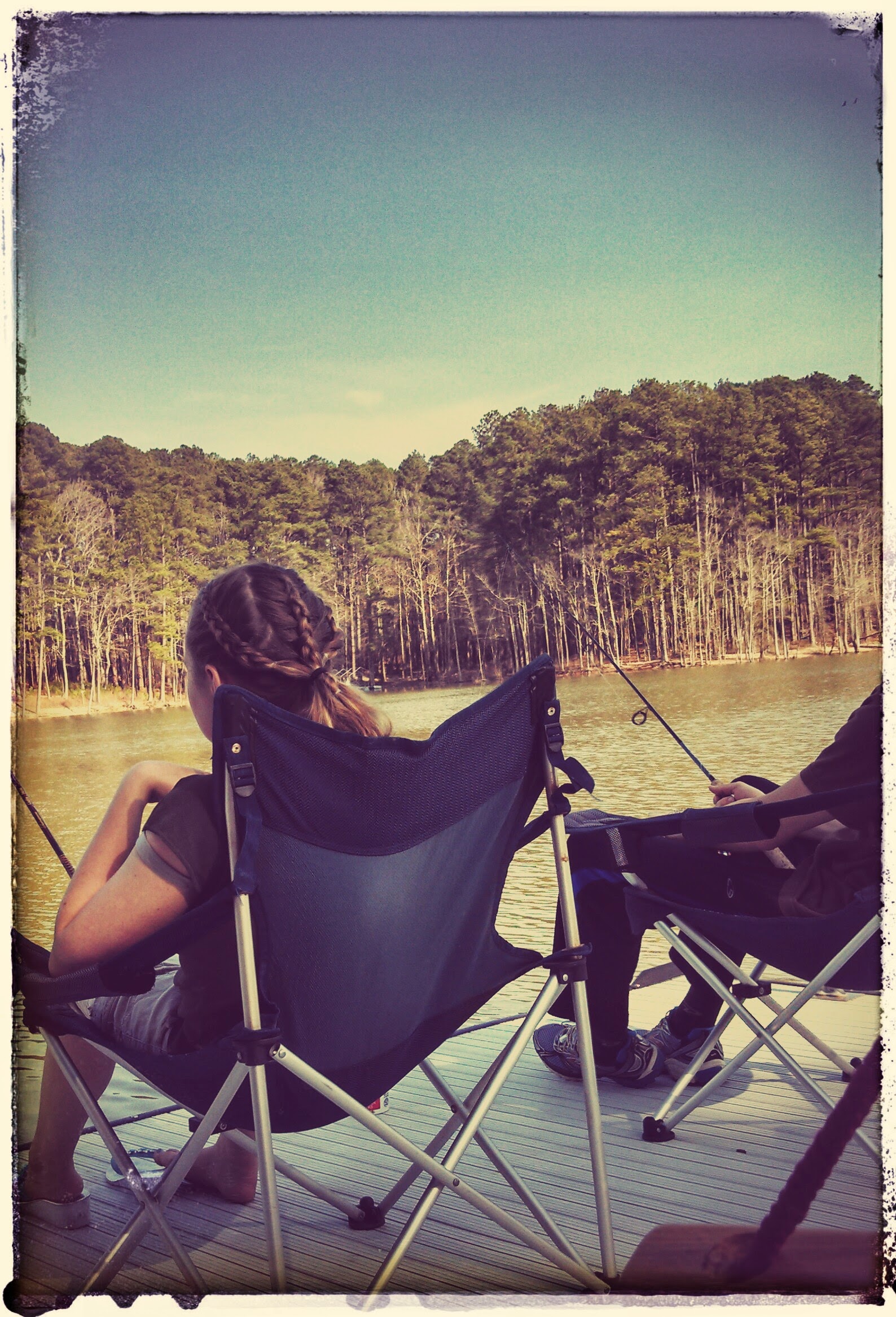
Suddenly, Riley sits up straighter. The top of her fishing pole bends, clearly tugged by something she can’t see. She fumbles for words. “I hear a fish. I hear a fish on my line,” she says, and this makes me smile, since in her case, it might actually be true. Riley has always been able to hear things the rest of us cannot. She will tell us a bee is near a full minute before any of the rest of us catch the first glimpse or sound. Still, for us it seems more likely that she feels the fish, and certainly, we can see that something pulls from below.
Kevin passes his fishing rod to Adam quickly, moving out of his chair. “Adam hold this for me. Riley, reel it in slowly, okay?” Click.click.click. I look over my book and see that Adam stands too, drawing in Kevin’s line. click.click.click. About the time Kevin helps Riley lift a writhing silver-green catfish from the lake, Adam lifts a dripping piece of chicken liver with a satisfied shriek. Kevin grabs the fish with gloved hands, wrapping a piece of towel around its belly. “Alright, Mom,” he calls to me, “we need a picture. He wraps Riley’s fingers around the fish, grinning. “Your first fish!”
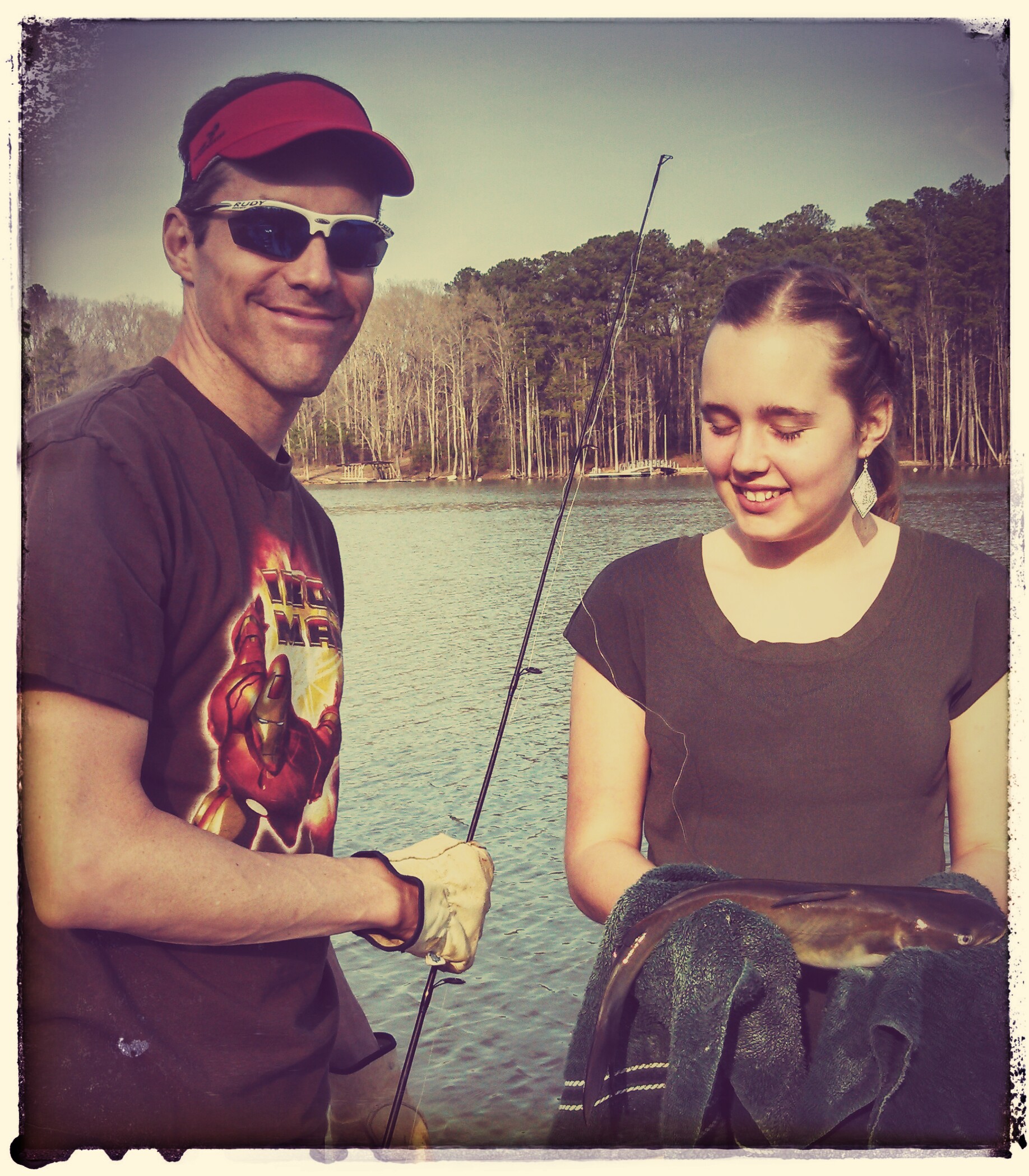
“It’s a fish!” Adam says enthusiastically, tossing the chicken liver on his line out over the water. He doesn’t allow enough slack in the line, and he has to hold the fishing rod a little lower to smack the water with the bait. It bounces on the surface, bobbing. Adam is so excited about Riley’s fish that he moves back and forth in a tiny space on the dock, holding the rod in one hand, flapping the other in the air beside him. Zoe throws her book in her chair and scrambles over to take a look. The catfish moans, a soft, guttural meew punctuated by the clear, wet sound of a bit of tissue opening and closing.
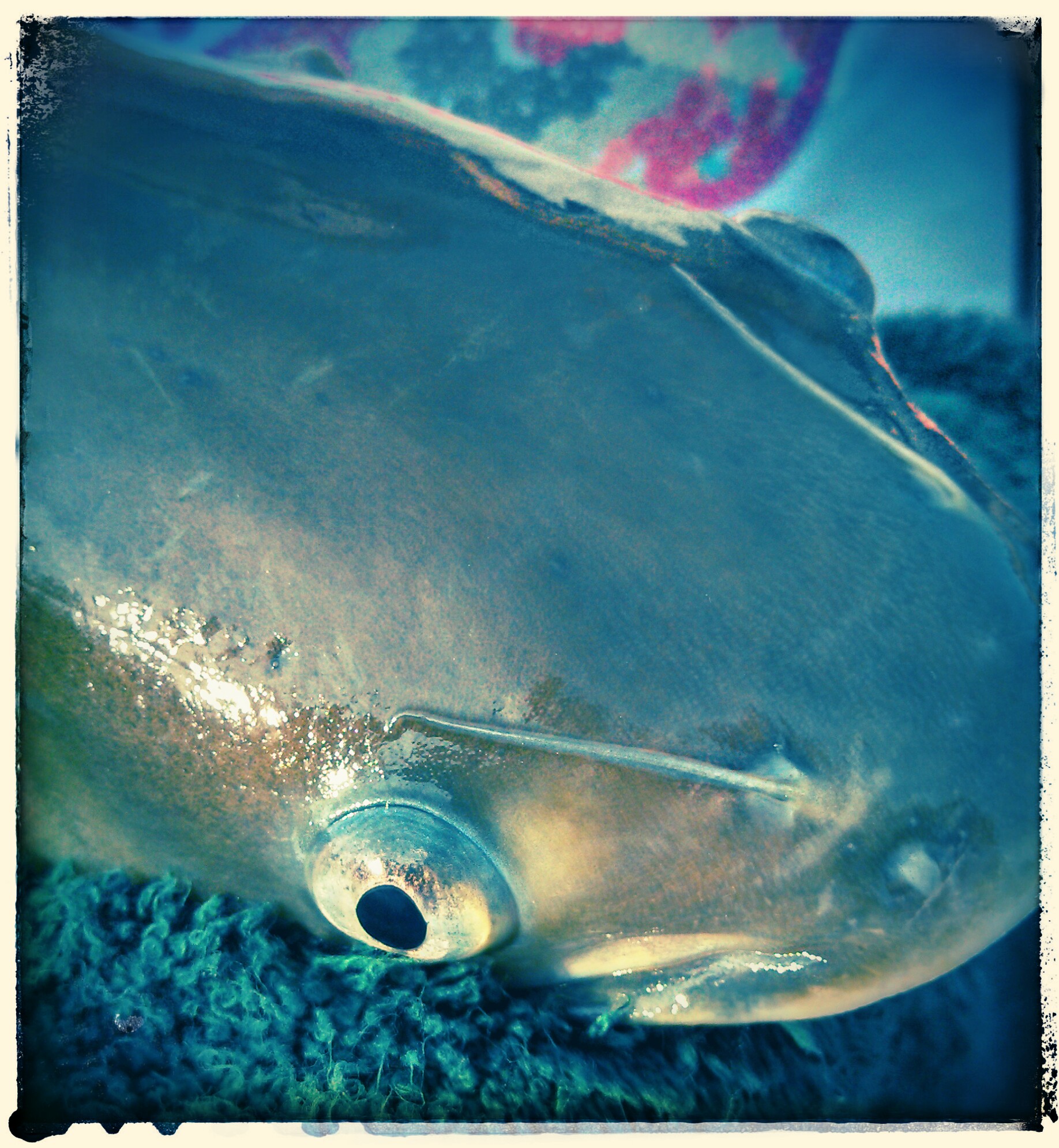
“Adam, put down the rod, please,” Kevin says, “Wait for me to help you.” He moves quickly over to Adam and takes the rod from his hands, laying it gently on the dock. “We don’t need to lose a rod or break the line,” Kevin says gently. “Just a minute.”
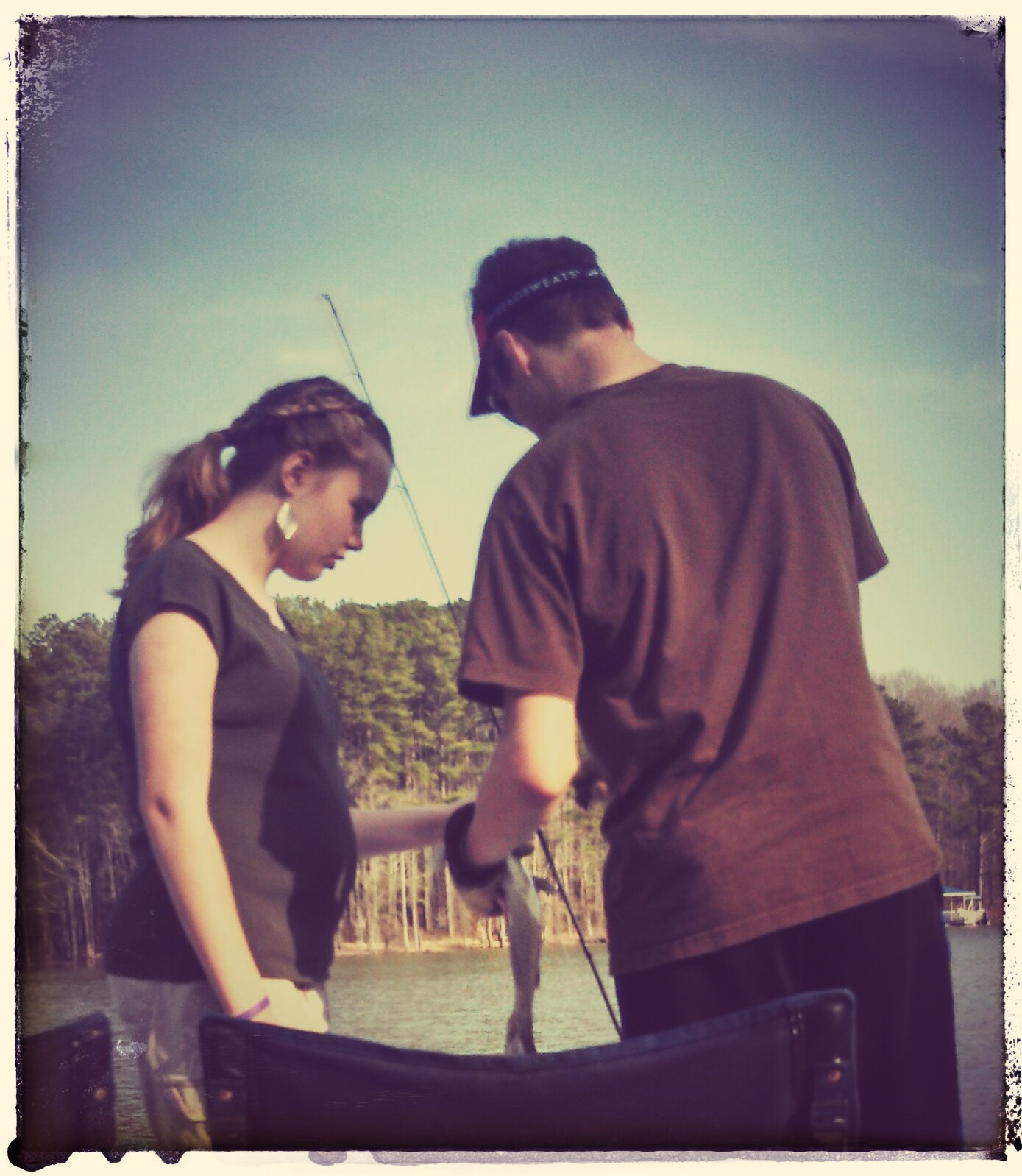
Then he returns to Riley, who grins down at the fish in her hands. I quickly snap a picture of the two of them, and then Kevin works to twist the hook out of the fish’s mouth, trying not to do any greater damage to it than is absolutely necessary. Once the fish is free, Riley bends down toward the water and tosses it back in, watching the silver skin flicker and disappear. Kevin helps her bait the hook again, and together they cast the line far and away. She settles into her chair, ready to be quiet and patient, ready to repeat the entire process again.
Suddenly, with the appearance of the first fish, everything changes on the dock. “Dad, can I try that?” Zoe says, watching Kevin pick up the other rod. Sometimes knowing that our efforts will matter, witnessing that the patient waiting actually brings results, is all the encouragement we need to follow.
“Of course you can,” Kevin says, chuckling, turning toward Adam. “Adam, do you want to try it too?”
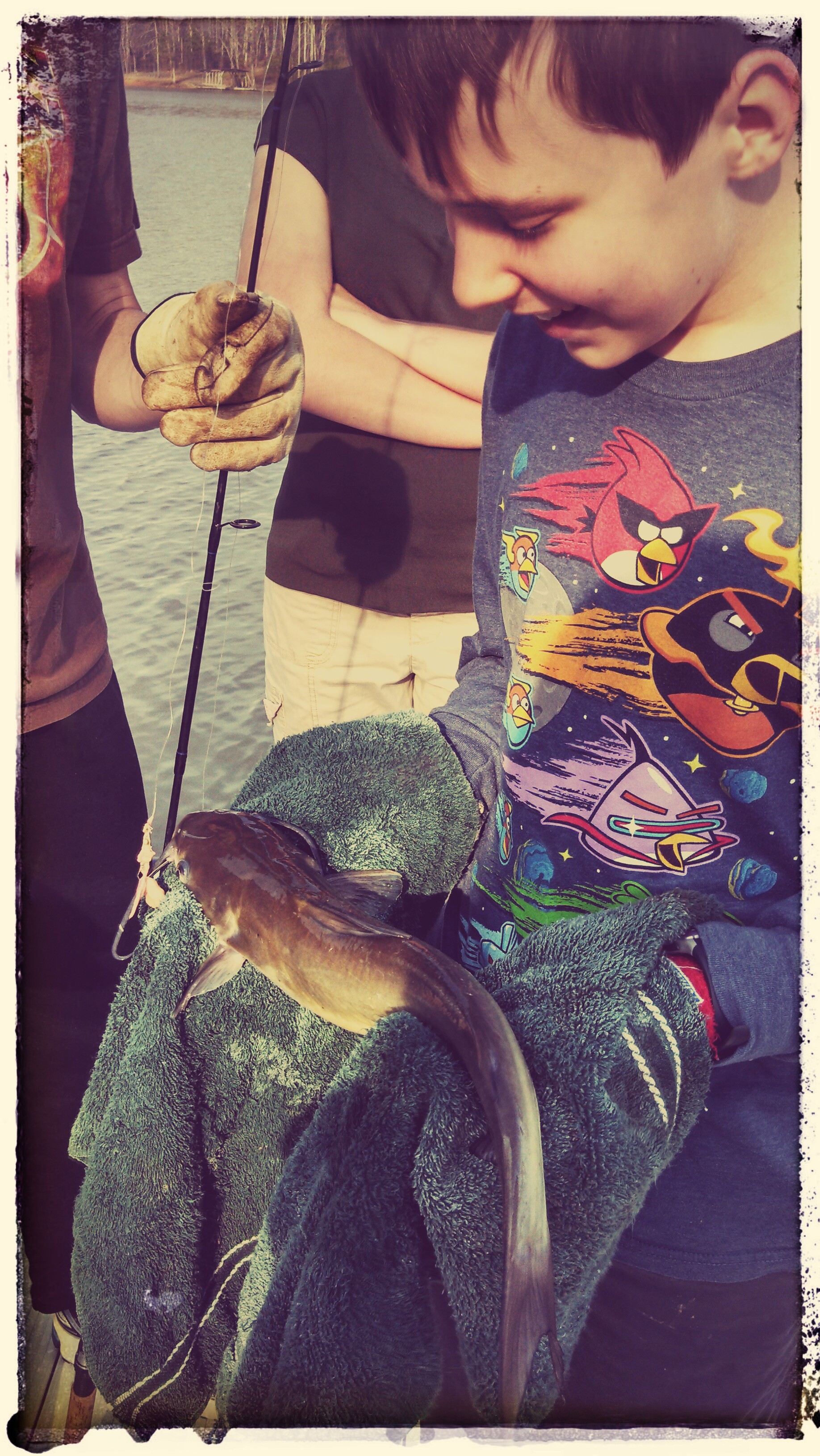
“Yes,” Adam says, suddenly eager. He reaches for the rod in Kevin’s hands, and together they cast the line, but as it turns out, Adam has a greater love affair with watching the chicken liver fly through the air over the water, with seeing the caught fish, then he actually has with the waiting, which is perhaps the most crucial part. Zoe does well for a while, but after she catches her first fish and it writhes in her hands; after we snap a picture and Kevin twists out the hook and Zoe lets the fish fall back into the lake with a plop, she is less patient with the process. The second time, she sits just a bit in the quiet before she tries to pass the rod back off to Adam and eventually lays it down again on the dock, with a final snap. Just that quickly, she has finished. Meanwhile, Riley sits for hours with a rod in her hands, quietly watching the water. She hardly shifts, so patient is she with the waiting, so content just with participating. I watch her and wonder what it would be like if we were so contented just to participate in what God’s doing, if we weren’t so impatient with Him over timing, if we didn’t become so easily bored with quietly waiting on Him or so enthralled with our own ideas about successful outcomes. We can hardly ever see what’s happening below, what He’s doing with the seeds we’ve planted.
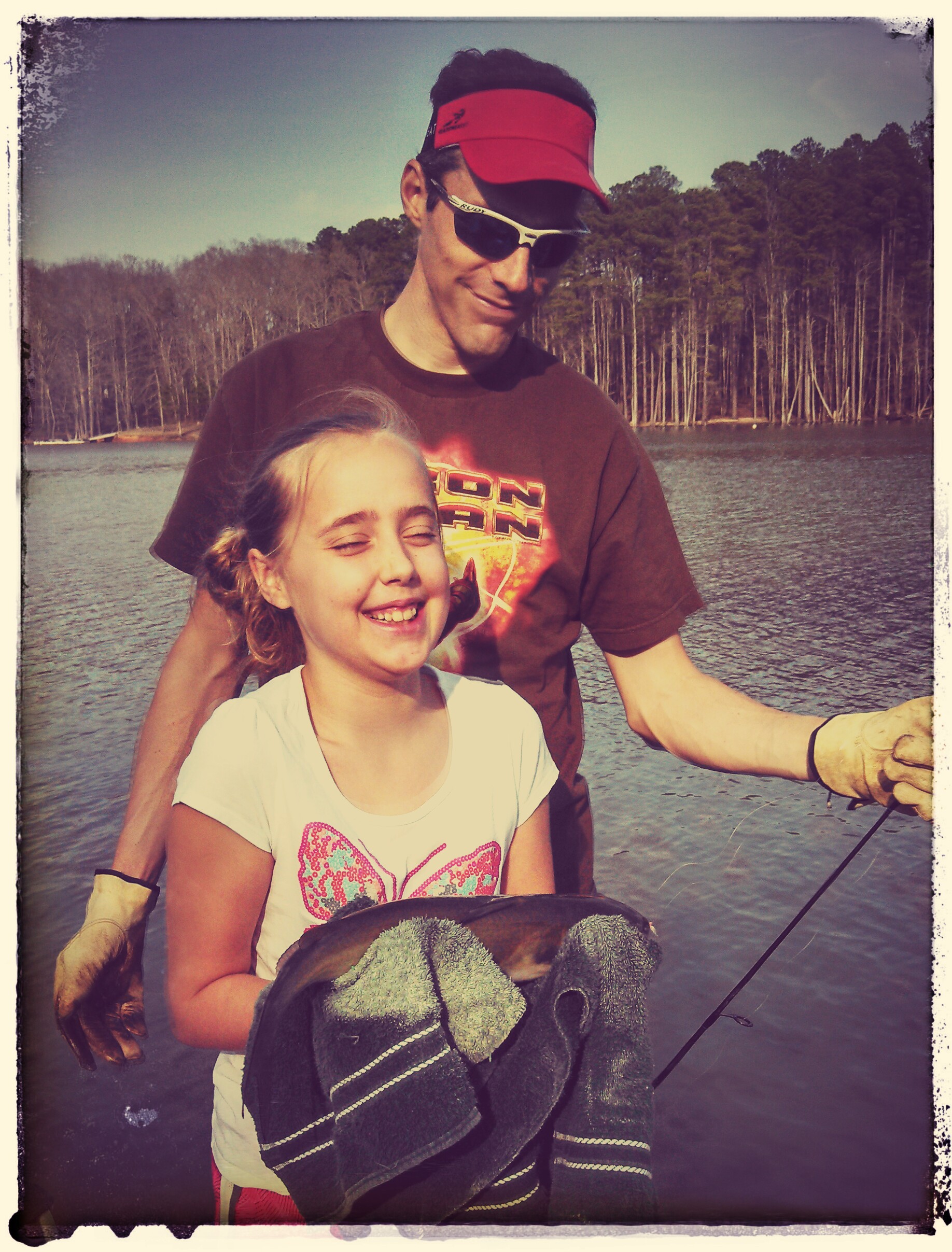
I’m fairly convinced that when Jesus tells His disciples, “Come, follow me, and I will send you out to fish for people (Matthew 4:19, emphasis mine),” He isn’t really referring to this chicken liver casting from the edge of a silver dock on a placid lake like a mirror reflecting the sky. In my heart, I see the many hands gripping the nets, the many hands casting, the many hands dragging in the catch. I see weathered men who smell like fish, men whose eyes reflect the sun and sky, men whose deep knowledge and skill run with the tides, the mending of nets, the untangling of gills and fins. I see men with greater understanding of what draws in the fish, how the water looks when schools move through it like a shadow, how the color of water changes before a storm comes than any real knowledge of how to satisfy the spiritually starving. But regardless of who these fishermen were or what kind of fishing they knew best, it occurs to me, watching Riley’s blonde hair lift in errant strands above her head as she sits waiting, patient and unmoved, that they knew what it meant to wait long for a catch. They understood what He meant, in the way they knew their own breathing, when he said, “I will send you out to fish for people.” They could not have made a living on the seas had they been impatient, had they been invested only in the casting and recovery. They could not have inherited that life had they been unwilling to learn, resistant to help, or disenchanted after the first taste of accomplishment. Fishing, it seems to me, is a patient, long-suffering, faithful investment. It’s work that will cut right into the beds of our fingers. And so it is with fishing for people, with the gathering of souls, with patiently loving the hurting. This resting in the hands of God like a line floating between heaven and earth–this pouring out we’ve chosen—it isn’t merely a hobby. It’s not just an amusement for our simpler, less cluttered times; not something we’ll eventually take up when we have a better opportunity. This is a life, a livelihood that will weather our skin and make us smell like fish and salt. We will be elbow-deep in the splashing, tangy brink. We will feel the soggy earth on our fingers and gaze at the flash of silver skin. We will patiently wait, yielding our arms and our hearts to His gentle training. He will help us cast ourselves far and wide, and sometimes it will be impossible to see or understand what’s happening below the depths. It will be impossible to guess how long it will take or if any given day’s effort will yield a catch. Sometimes we will pierce the open mouths of the hungry with the truth they need and pull too hard and fast, and we will scare away the most vulnerable. Sometimes, the truth will rip a gaping hole right into a life, and we will show ourselves without compassion for the piercing of a heart. But still, He will insist that we leave behind our familiar comfort, and He will persistently teach us to fish for people. He will teach us to wait faithfully, to be content with not knowing how or when. And slowly, by the turning of the tide, we will come to see ourselves as fishermen.
